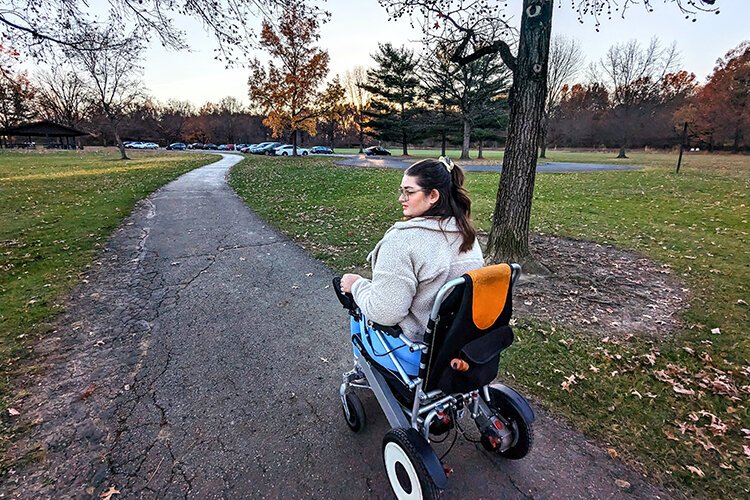Can you go to the bathroom if you need to while you’re at work? What about when you go for a walk in the park?
It’s something Marisa Spain, 27, who grew up in Marysville, considers before going anywhere. She has facioscapulohumeral muscular dystrophy (FSH), a progressive genetic condition that weakens multiple muscles in her body and means she uses a power wheelchair to get around.
“I wouldn’t go somewhere where I couldn’t guarantee there would be restrooms available,” Spain said. “If you’ve never been there before, that sounds a little silly. You might think, ‘I take it for granted that in this place I’ll have access to a restroom if I need one.’ For me, that’s never a given.”
Spain, who works as a policy research assistant for the city of Detroit’s Office of Disability Affairs, said she was inspired to raise awareness about experiences like this after talking with a colleague about how they evaluate the accessibility of public restrooms.
Based on that conversation, Spain decided to launch a YouTube channel called Disabled in Nature in July 2023. Through this platform, Spain shares her thoughts and experiences in a fun, engaging, and informative way. The first piece in the series, titled “When Nature Calls,” covered the accessibility of bathrooms at her workplace, which she rated “8/10. I want to go to the bathroom again.”
Spain says bathroom accessibility isn’t the only topic she wants to share on her channel — she also shares her own story about growing up with a progressive disability, using a power wheelchair, and the struggles of getting a van to serve people with disabilities.
“The name of the channel, Disabled in Nature, is a reference to two aspects of my personality and my life so far,” Spain says. “I’m very passionate about accessibility, disability advocacy and inclusion, but I also love being outside. What I’ve realized, especially since I started using a wheelchair, is that outdoor spaces aren’t as accessible as we think they are.”
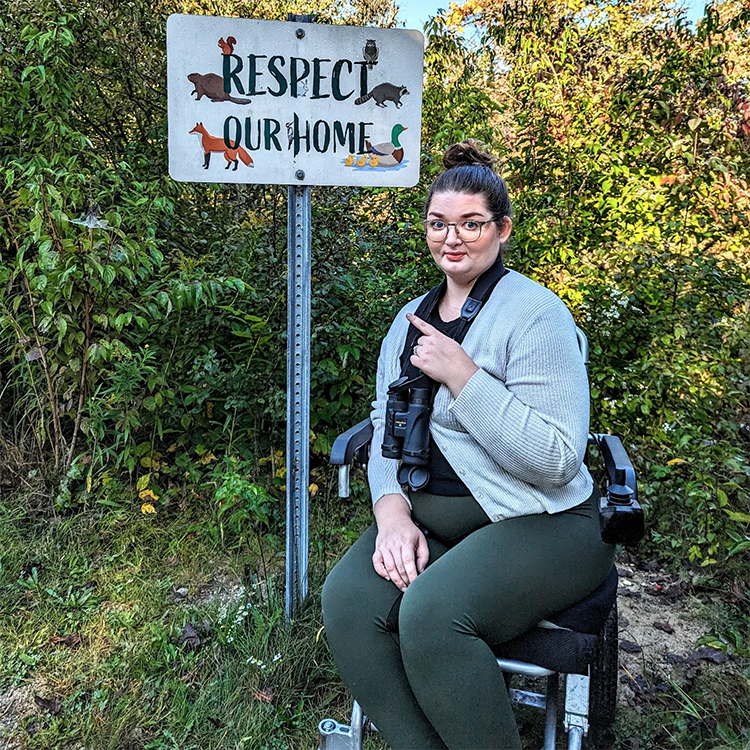
 “What I’ve noticed, especially since I started using a wheelchair, is that outdoor spaces are not as accessible as they should be,” says Marisa Spain. Spain has always enjoyed the outdoors; growing up able-bodied, she spent a lot of time in nature and earned a master’s degree in wildlife science. After learning that a career in the industry comes with many challenges for someone in a power wheelchair (many jobs require lifting 70 pounds and being able to walk on any terrain), Spain made a career shift and is now an ADA certification coordinator.
“What I’ve noticed, especially since I started using a wheelchair, is that outdoor spaces are not as accessible as they should be,” says Marisa Spain. Spain has always enjoyed the outdoors; growing up able-bodied, she spent a lot of time in nature and earned a master’s degree in wildlife science. After learning that a career in the industry comes with many challenges for someone in a power wheelchair (many jobs require lifting 70 pounds and being able to walk on any terrain), Spain made a career shift and is now an ADA certification coordinator.
“I’d love to start a little consulting business on the side where I get called in to evaluate park projects and things like that,” she says. “Even if we’re ADA compliant, the ADA is a minimum standard. A lot of things that aren’t in the ADA can easily be incorporated into a project to make it more accessible to everyone.”
Spain was able to pass on her knowledge and experience to her parents, Brian and Regina, who own the Enter Stage Light theatre company and Citadel Stage in downtown Port Huron, and who she said have worked hard to promote accessibility in theater.
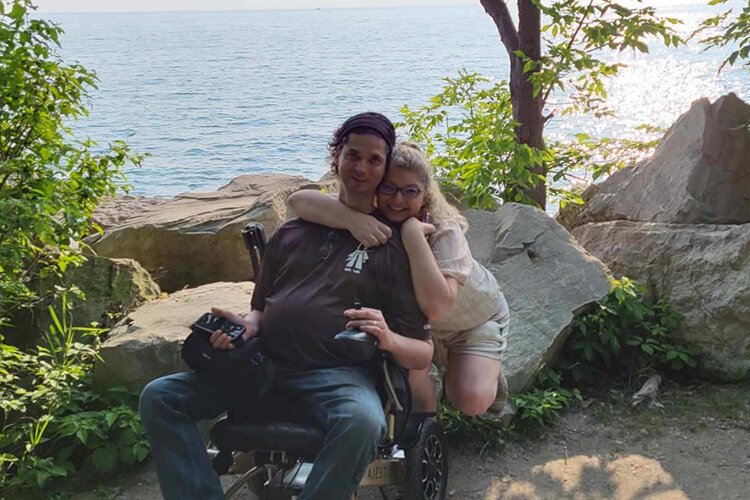
 Marisa Spain’s parents, Brian and Regina Spain;
Marisa Spain’s parents, Brian and Regina Spain;
For example, the toilets and dressing rooms are downstairs, so Spain says she applied for a grant to install a lift to give her parents wheelchair access. She also applied for a grant to install hearing loops so people with hearing aids can enjoy the performances, and recently received a grant to install audio description services for the blind and partially sighted.
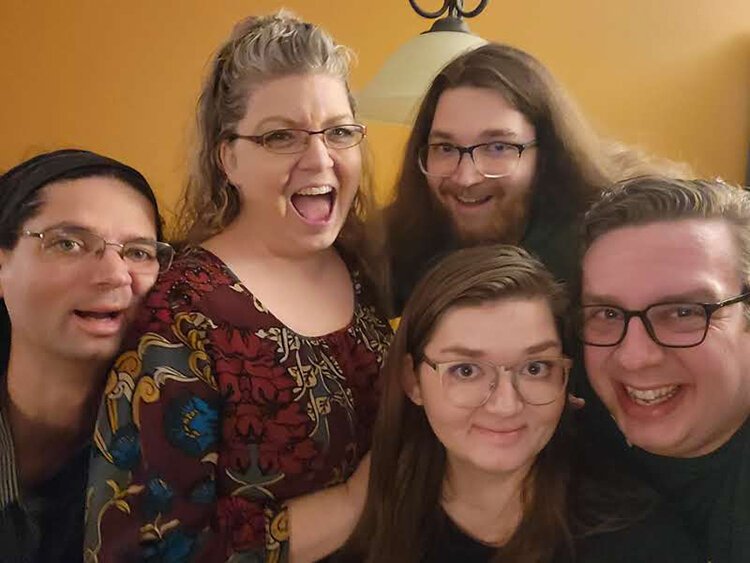
 Marisa Spain and her family: (From left) Marisa’s father Brian Spain, mother Regina Spain, brother Wesley Spain, and husband Aaron Rose. “They’ve done a lot of good things for a lot of people,” Spain says. “I’m really proud of them and the work they do.”
Marisa Spain and her family: (From left) Marisa’s father Brian Spain, mother Regina Spain, brother Wesley Spain, and husband Aaron Rose. “They’ve done a lot of good things for a lot of people,” Spain says. “I’m really proud of them and the work they do.”
In a video rating the accessibility of bathrooms at a theater her parents own, Spain rated the toilets as “9.5/10. I would 100% go back there again.”
As her YouTube channel continues to grow, Spain says she hopes to bring even more awareness to the disability community and their needs.
“One of the main things I want to do is increase the number of people who say, ‘We exist. Think of us. Think of us,'” she says. “I remember living with an able-bodied mindset and never having to think about these things we’re going through now. So I don’t necessarily blame people for not knowing about the issues and struggles that the disabled community goes through, but I do believe that if it was more widespread, more people would think about it.”
But nature parks aren’t the only places where accessing the outdoors can be difficult for people with mobility issues. Even simply walking around the block can be a challenge, especially in the winter. In fact, Spain said the first time she was able to leave her home in 2024 was on Jan. 26.
“The sidewalks were impassable,” she said. “Obviously I couldn’t go out and run my daily errands. I’m lucky that I have a husband who helps me with those errands and stuff, but I couldn’t go to work.”
Spain’s job allows for a hybrid work environment, but on days when others are in the office, she has had to work from home.
While accessibility is a key aspect of her YouTube channel, another topic Spain wants to highlight is how costly it can be to be disabled, and one of the ways she does this is by walking viewers through her long journey to getting an accessible van, which has taken her two years so far.
“I need a $106,000 van to get around on my own. I can’t imagine buying a Porsche for that kind of money,” she said.
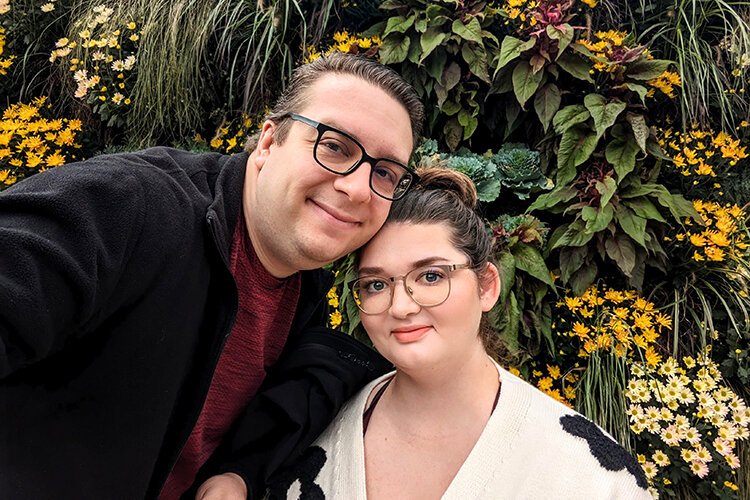
 Marisa Spain and her husband Aaron Rose.
Marisa Spain and her husband Aaron Rose.
Spain said there are resources available to apply for assistance with these kinds of purchases, but it takes a lot of advocacy, she said, adding that she has a husband who helps her financially and physically. She also has a travel wheelchair that she can bring into the car by lifting the backrest, but it’s painful, dangerous and exhausting.
“This took two years,” she says. “I don’t know what I would have done if I hadn’t had outside financial support and been in a situation where I couldn’t work without this equipment.”
In the past two years, Spain also got a custom-made power wheelchair, a cost she says was covered by her employer’s insurance, but without insurance, the wheelchair would cost $38,000.
“It costs about $140,000 just to leave home,” she said. “This is the huge economic inequality that people with disabilities face.”
While awareness and advocacy are important to her, Spain said she ultimately hopes her YouTube channel can be a presence for people with disabilities, maybe even people who share her disability.
“The first video on my channel is called ‘Becoming What I Wish My Younger Self Had,'” she says. “That’s the core of what I want to achieve. If just one person watches my video and resonates with me, then it will all be worth it.”
For more information on our Spanish content, please visit youtube.com/@DisabledInNature or instagram.com/disabledinnature.

